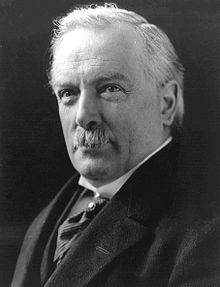David Lloyd George, 1st Earl Lloyd-George of Dwyfor
|
The Right Honourable David Lloyd George OM PC |
|
|---|---|
 |
|
| Prime Minister of the United Kingdom | |
|
In office 6 December 1916 – 19 October 1922 |
|
| Monarch | George V |
| Preceded by | H. H. Asquith |
| Succeeded by | Bonar Law |
| Leader of the Liberal Party | |
|
In office 14 October 1926 – 4 November 1931 |
|
| Preceded by | H. H. Asquith |
| Succeeded by | Herbert Samuel |
| Secretary of State for War | |
|
In office 6 July 1916 – 5 December 1916 |
|
| Prime Minister | H. H. Asquith |
| Preceded by | The Earl Kitchener |
| Succeeded by | The Earl of Derby |
| Minister of Munitions | |
|
In office 25 May 1915 – 9 July 1916 |
|
| Prime Minister | H. H. Asquith |
| Preceded by | Office created |
| Succeeded by | Edwin Samuel Montagu |
| Chancellor of the Exchequer | |
|
In office 12 April 1908 – 25 May 1915 |
|
| Prime Minister | H. H. Asquith |
| Preceded by | H. H. Asquith |
| Succeeded by | Reginald McKenna |
| President of the Board of Trade | |
|
In office 10 December 1905 – 12 April 1908 |
|
| Prime Minister |
Henry Campbell-Bannerman H. H. Asquith |
| Preceded by | The Marquess of Salisbury |
| Succeeded by | Winston Churchill |
| Father of the House | |
|
In office 31 May 1929 – 13 February 1945 |
|
| Preceded by | T. P. O'Connor |
| Succeeded by | The Earl Winterton |
| Member of Parliament for Carnarvon Boroughs |
|
|
In office 10 April 1890 – 13 February 1945 |
|
| Preceded by | Edmund Swetenham |
| Succeeded by | Seaborne Davies |
| Personal details | |
| Born |
17 January 1863 Chorlton-on-Medlock, Manchester, Lancashire, England |
| Died | 26 March 1945 (aged 82) Tŷ Newydd, Caernarfonshire, Wales |
| Citizenship | British |
| Nationality | Welsh |
| Political party |
Liberal (1890–1916 & 1924–45) National Liberal (1922–23) |
| Spouse(s) |
|
| Children |
Richard Lloyd George, 2nd Earl Lloyd-George of Dwyfor Mair Eluned Lloyd George (died 1907, aged 17) Gwilym Lloyd George, 1st Viscount Tenby Lady Olwen Evans Lady Megan Lloyd George |
| Parents | William George Elizabeth Lloyd |
| Profession | solicitor, politician |
| Signature | |
David Lloyd George, 1st Earl Lloyd-George of Dwyfor,OM, PC (17 January 1863 – 26 March 1945) was a British statesman of the Liberal Party. As Chancellor of the Exchequer (1908–1915), Lloyd George was a key figure in the introduction of many reforms which laid the foundations of the modern welfare state. His most important role came as the highly energetic Prime Minister of the Wartime Coalition Government (1916–22), during and immediately after the First World War. He was a major player at the Paris Peace Conference of 1919 that reordered Europe after the defeat of the Central Powers.
As Prime Minister, Lloyd George favoured the Conservatives in his coalition in the 1918 elections, leaving the Liberal Party a minority. He became leader of the Liberal Party in the late 1920s, but it grew even smaller and more divided. By the 1930s he was a marginalised and widely mistrusted figure. He gave weak support to the Second World War amidst fears that he was favourable toward Germany.
He was voted the third greatest British prime minister of the 20th century in a poll of 139 academics organised by MORI, and in 2002 he was named among the 100 Greatest Britons following a UK-wide vote.
Lloyd George was born on 17 January 1863 in Chorlton-on-Medlock, Manchester, to Welsh parents, and was brought up as a Welsh-speaker. He is so far the only British Prime Minister to have been Welsh and to have spoken English as a second language.
...
Wikipedia
